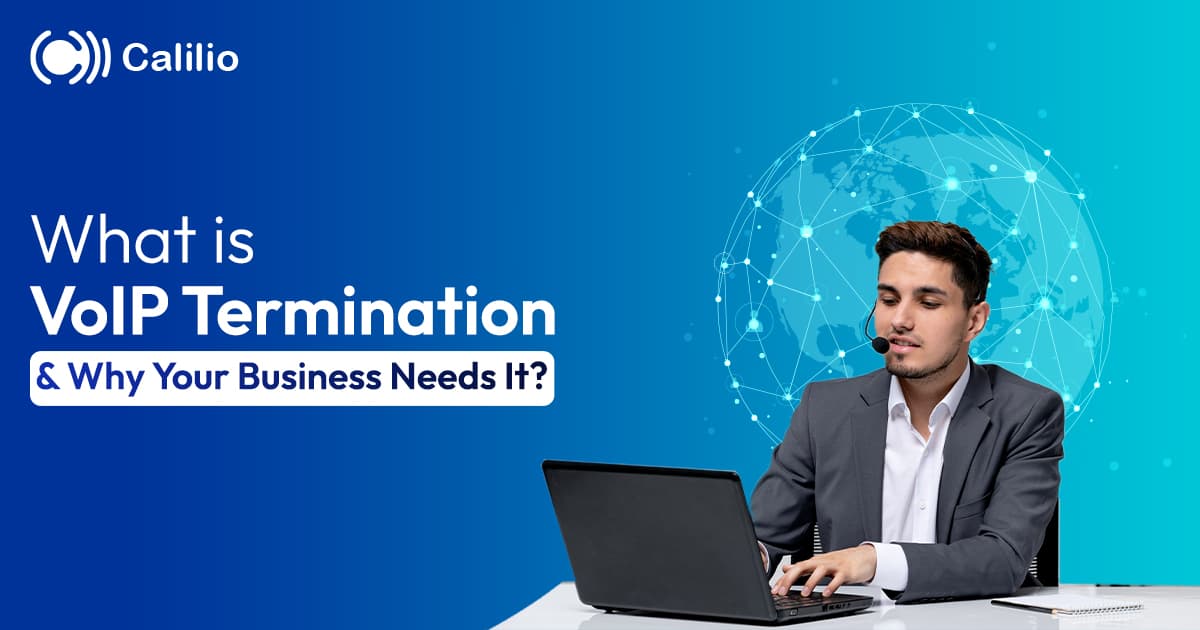VoIP Termination - A Detailed Guide

Summarize this blog with:
As the world is getting more digitized, it is getting smaller. No matter where you are, you can easily contact anyone and have a conversation instantly. Formerly, there were only traditional means of communication, such as telegraphs and later landline phones. But due to the introduction of VoIP (Voice over Internet Protocol), things have been much easier. Just with the help of the internet, a person can contact anyone without worrying about high calling costs, regardless of location. Moreover, one can even call and converse with someone outside the VoIP service, all thanks to VoIP termination.
Generally, termination means the act of ending or concluding something. However, in telecommunications, it means something different. So today, let’s learn what a VoIP termination is, how it works, alongside what kind of companies depend on its usage, and more.
What Is VoIP Termination and How Does It Work?
VoIP termination, also known as voice termination or call termination, is the routing of calls from one carrier/provider to another until the calls are delivered to the intended destination. It is a way of delivering outbound calls. The call can end on different platforms: online apps (Skype, WhatsApp), traditional landlines, or mobile networks.
As mentioned above, when a call is made, it is routed from one mobile or provider to another until it reaches its destination. Voice termination relates to the point where the call is received. The VoIP termination provider is also responsible for organizing the data when it arrives at its intended place.
VoIP technology breaks down voice into small packets and sends them through the internet. The termination provider processes the packets and determines the best route to deliver calls. If the receiver is on a traditional phone network (like PSTN), then digital packets are again converted back to analog signals, which are understood by the receiver’s phone.
VoIP Termination Problems
VoIP call termination has become an essential part of the digital world. While it has many benefits, it also has some issues. However, these problems can be solved with technical knowledge and by consulting with providers.
1. Data Packet Loss
Data packet loss occurs when packets transmitted over the network fail to reach their intended destination, leading to poor voice quality. It is generally caused by network congestion, weak connections, or faulty hardware.
2. Call Delivery Issue
Calls will not reach their determined location if the VoIP infrastructure, customer equipment, or router fails. Contact your provider to find out the reason behind the loss. If they can't help, consider a replacement.
3. Poor Call Quality
The Internet plays an important role in VoIP calling. If you experience poor call quality with VoIP call termination, first check the internet’s speed. This is usually the result of insufficient bandwidth, network congestion, or poor routing.
Why Does Your Business Need VoIP Call Termination?
VoIP call termination is crucial for any business that wants to grow nationally/globally and stay connected in the digital world. It provides an affordable way to communicate internationally or make long-distance calls. It uses the internet instead of phone lines, which improves the quality of calls.
The various reasons your business needs VoIP termination are further below:

1. Affordable Call Rates
VoIP call termination is more affordable than the old-fashioned phone line-based services. This cost-effectiveness is particularly crucial for businesses that handle a high volume of long-distance calls, allowing them to reduce their communication expenses significantly.
2. Automated Workflow
VoIP services allow organizations to streamline communication by integrating modern features like automatic call distribution (ACD) and interactive voice response (IVR). For example, when a consumer calls a business, ACD and IVR help them reach their desired department, whether sales or customer services, without any human interference. This helps ensure smooth operations, increases productivity, and decreases manual involvement.
3. Improved Call Quality
VoIP service providers work best to avoid dropped calls, poor audio quality, and post-dial delay by ensuring crystal-clear communication for both local and international calls. If a company conducts a meeting using VoIP call termination, there is less chance of losing important details or updates due to poor audio quality.
4. Scalability
VoIP call termination is highly scalable, allowing businesses to adjust their communication needs as they grow. As a company expands internationally, it can scale the VoIP system to include more clients without investing in expensive infrastructure. This flexibility ensures the business can grow without any communication gaps.
Industries That Rely on VoIP Termination Services
There are various industries that rely on VoIP Termination Services.
1. Call Centers and BPOs
Call centers rely heavily on VoIP termination services to effectively handle large volumes of inbound and outbound calls. VoIP enables features like call routing, recording, and analytics, which are crucial for customer service and technical support. In particular, BPOs (Business Process Outsourcing) utilize these services for international client management, often operating across different time zones.
2. Marketing and Advertising Company
Marketing and advertising companies make many calls to conduct market research, promote products or services, and maintain good customer relationships. VoIP termination services enable these companies to place outbound calls over the Internet, even to traditional phone networks worldwide.
3. International Business and Enterprises
International businesses and enterprises leverage VoIP termination services to streamline communication across global operations. These services facilitate cost-effective and reliable international calling, enabling seamless connectivity between branches, clients, and partners in various countries.
How to Choose the Best VoIP Termination Provider?
Selecting the right VoIP termination provider is critical for ensuring high-quality calls, cost-effectiveness, and smooth communication. The provider you decide on can significantly impact the reliability of your business operations and customer satisfaction. Here are some key factors to consider when picking the best VoIP termination provider to meet your needs:
1. Requirements and Budget
The first thing to consider while choosing the best voice-over IP termination is budget and requirements. Determine the volume of calls and destination because some providers offer competitive rates for certain regions. Additionally, understanding your requirements helps you determine the provider that meets your needs. So, you should prefer a provider that complies with your operational necessities and is within your budget.
2. Call Quality
Ensuring excellent call quality is the top priority while deciding on the best VoIP call termination. Make sure that your provider offers high-quality voice calls even with a normal bandwidth and minimum response time. Settle on the one that provides HD voice quality, especially for international calls, which helps maintain crystal-clear and reliable communication.
3. Global Reach
To expand your business globally, choose a provider with extensive coverage across different countries and regions. This will ensure you can make and receive calls where your business and customers operate. It is mainly important for firms involved in international trade, customer support, and remote work.
4. Security and Customer Support
Security is the most important element to consider when picking out a provider. Make sure it has strong security measures such as encryption protocols, fraud detection, and real-time monitoring systems. Besides security, reliable 24/7 customer support is equally important. A provider with it helps maintain uninterrupted communication and solve technical problems efficiently.
Tiers of VoIP Termination Providers
VoIP termination providers are categorized into different types, reflecting their network, reach, and the volume of the calls they handle. Understanding these tiers can help businesses and individuals choose the right provider for their needs. Here’s a breakdown of the tiers in the VoIP termination market:
1. Tier 1 Telecommunication Carrier
Tier 1 providers are large carriers or operators who own and operate their own physical network infrastructure. These providers have direct agreements with local telecom operators across various countries, allowing them to route calls directly without passing through another carrier. They offer the best quality of service with high reliability and call quality but may have higher prices due to the extensive infrastructure they maintain. They also have agreements with Tier 2 and Tier 3 carriers.
2. Tier 2 Telecommunication Carrier
Tier 2 providers do not have their own networks over which they provide services but have significant scale and reach. Some Tier 2 carriers use Tier 1's existing network, while others run a hybrid network using their own infrastructure. These providers offer competitive rates and reasonably good standards, effectively balancing cost and quality.
3. Tier 3 Telecommunication Carrier
Tier 3 providers are niche providers or starter carriers that are smaller and often purchase call termination services from Tier 1 or Tier 2 providers. They focus on providing cost-effective solutions but with potentially lower call quality and reliability. Tier 3 providers are suitable for businesses and consumers who are looking for affordable VoIP solutions.
VoIP Call Termination with Calilio
VoIP termination has become an integral part of modern communication, providing businesses with an affordable and scalable solution for handling local and international calls. While it provides many advantages, such as cost savings, improved calls, and work automations, it also suffers from some issues.
Calilio Introduces Affiliate Program
Earn 30% lifetime commission on every paid referral.
Turn your audience, network, or customers into a recurring revenue stream.

30% recurring commission on every paid referral

Lifetime earnings for as long as the customer stays subscribed

Unique referral link with real-time tracking

Perfect for agencies, consultants, creators, and SaaS partners

Frequently Asked Questions
What Is Origination and Termination VoIP?
Call origination is the process of receiving calls from a traditional phone network (PSTN) and routing them to a VoIP or your usual communication network. VoIP termination is the process of sending VoIP calls to their final destination, whether in the VoIP network itself or a traditional phone/mobile network.
What Is the Difference between VoIP Termination and SIP Termination?

Still have questions?
Can’t find the answer you’re looking for? Please chat with our friendly team.
Stay in the loop
Get the latest call insights, trends, and updates delivered straight to your inbox.
By subscribing, you agree to receive updates from Calilio.
You can unsubscribe anytime.